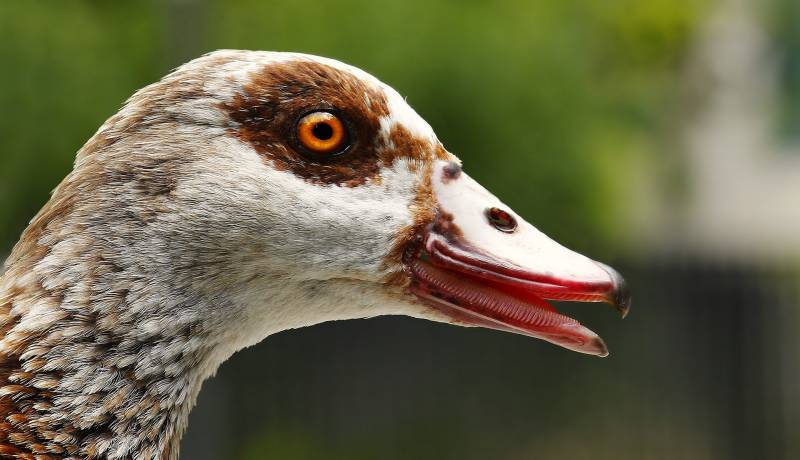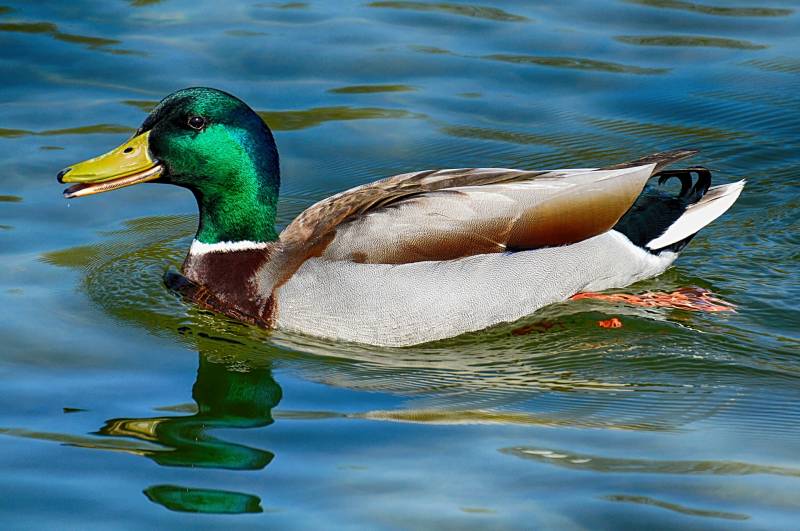Quick Navigation
People love domesticating ducks either as pets or farm animals for commercial poultry purposes.
Almost all the present domestic ducks are crossbred and have either of these two common ancestors: Mallard and Muscovy.
Many love raising these calm, adorable, and intelligent creatures in their backyard and farms.
Though ducks rarely get sick, sometimes you might notice your ducks breathing with an open mouth.

The cause of this breathing behavior may vary from a common heat stress mechanism to a severe respiratory infection.
In this brief guide, we’ll explain all the possible reasons why your duck might be breathing with an open mouth.
Duck Breathing With Open Mouth
For centuries, ducks have been a part of backyard gardens and farms.
Ducks are sturdy, active, and healthy. They’re rarely sick or injured.
Occasionally, ducks battle with health problems such as moldy bedding, leg injuries, wounds from predators, and respiratory illnesses.
You’ll know your duck has breathing problems if it lies on the ground, breathes with an open mouth, or sometimes even starts panting.
Ducks’ breathing problems are generally associated with heat & humidity in the hot season, fear, and poor sanitation.
The following can be the reason why your duck is breathing with an open mouth or panting:
Heat Stress
Abdominal heaving or panting in temperate season can be a subtle clue that your duck is feeling too hot in its environment.
Marcos H. Rostagno stated in this research article that heat stress is an environmental stressor affecting waterfowl production globally.
Marcos H. Rostagno is a research animal scientist in the Livestock Behavior Research Unit, USA. He is an expert in poultry science and research.
According to Rostagno, heat and high humidity in hot seasons can activate the stress mechanism of ducks.
The activation of the stress mechanism can result in adverse effects on the breathing of ducks.
Ducks and other domestic birds (chickens, geese, etc.) are more sensitive to heat and humidity.
Heat stress can result in adverse effects on their breathing.
Rostago explains that duck body temperature is higher compared to mammals and humans.
Unlike humans and mammals, ducks also don’t have sweat glands.
Ducks and other domestic avians have higher body temperatures as their bodies are covered with thick layers of feathers.
These thick layers of feathers don’t let the internal heat escape from the body.
Ducks have no other route to maintain their core internal temperature other than breathing with an open mouth.
With no sweat glands and feathers covering their bodies, instead of breathing through their nares, ducks breathe with open mouths.
How To Deal With Heat Stress In Duck
If on a hot and humid day you see your duck breathing with an open mouth, don’t panic.
It may be a way of releasing internal heat and maintaining its core internal temperature.
Ducks’ access to cool, fresh water, ventilation, and adjusted feed schedules are important to relieve them.
Provide your ducks with plenty of fresh water and shady open areas to sit and walk.
Exposure to heat stress may also affect ducks’ diet intake, diet efficiency, and weight gain.
In domestic ducks, heat stress may also cause a rise in body temperature, blood pH, and panting.
Increased water ingestion during a temperate season may help your duck maintain its body temperature.
Respiratory Infections
In ducks, breathing with an open mouth accompanied by tail pumping can also be an early sign of respiratory infections or illness.
Subtle clues for respiratory infections other than abdominal heaving are nasal discharge, low appetite, bowing of the tail up and down to assist in breathing, and lethargy.
Ducks’ respiratory infections or illnesses are generally associated with poor sanitation, stagnant water, and intensely cold or wet weather.
Although Aspergillosis symptoms are almost similar to respiratory infections, both respond to different treatments.
What To Do
If you see your duck hunched up and breathing with an open mouth, consult a vet for treatment.
Whether your duck has Aspergillosis or respiratory infections, both require you to visit a vet.
Your vet will better evaluate the problems behind your duck’s labored breathing and give your medications accordingly.

Not all antibiotics can be given to ducks. Some are extremely toxic for them.
Your vet will better assist you in handling the duck breathing problem.
It is always better to seek professional advice for medication than to be sorry and cause additional health problems.
Your vet will most probably give you a handful of antibiotics for a respiratory infection.
As bird lungs are weak, you’ll have to pay extra attention to your duck during this time.
Although not contiguous, isolate the infected duck from the rest of your flock.
Aspergillosis
The fungus Aspergillus fumigatus causes Aspergillosis in ducks and other domestic and wild avians.
Aspergillosis is deadly for your baby ducks (ducklings). It usually attacks 12 to 14-days old ducklings.
Aspergillosis is highly dangerous as it can cause death in ducklings without even showing any subtle clues.
Infection may not be evident early in the disease, and ducks may exhibit very vague symptoms such as tail bobbing or weight loss.
In older ducks, aspergillosis can be associated with labored breathing and other respiratory issues.
Aspergillosis in wild or domestic ducks can be caused by molding straws.
Unfortunately, there is no hundred percent cure for aspergillosis in ducks.
How To Address Them
You can try some fungicides. But they’re expensive and not guaranteed full recovery.
Therefore, it is highly significant that you choose your ducks’ bedding with utmost care and attention.
If you continue not re-exposing ducks to molds they are going to recover spontaneously.
Prevention is, of course, a hundred times better than cure.
Conclusion
To conclude, if you see your duck breathing with an open mouth or unnaturally, figure out the cause first.
Try to diagnose the problem, and if you can’t do it, immediately consult a vet.
Let a professional person evaluate your duck breathing abnormalities and prescribe a medication or cure for it.
As we said earlier, It is always better to be safe about your duck’s breathing mechanism than to be sorry.
Improper handling may make primary breathing abnormalities worse or result in additional duck health issues.
To ensure your ducks’ health, give them balanced diets, maintain sanitation, provide fresh water, and fumigate duck houses & incubators.

A passionate content creator on pet behavior, nutrition choices, and health, Mike is an experienced pet expert. He has been writing on multiple websites to compensate for his passion for cats. Mike grieves around plenty of pets in his parents’ house. At the start of his career, he had a sturdy intention to be a part of pet care by any means.
With his affiliation to Purrfect n’ Pawesome, he found a way to satiate his craving to participate in pet health, wellness, and behavior analysis. He has been a significant part of our team and a major contributor in equipping our site with useful, authentic, and research-backed articles.
“I love pets as much as I love to travel to explore multiple places and lifestyles. I have been attached to this pawsome platform for many years, and my experience regarding pets has enhanced significantly by using various devices to write articles. I believe in writing my thoughts and experiences, so I try to write down the experience and learnings for my readers no matter where I am and what my mood is.”
